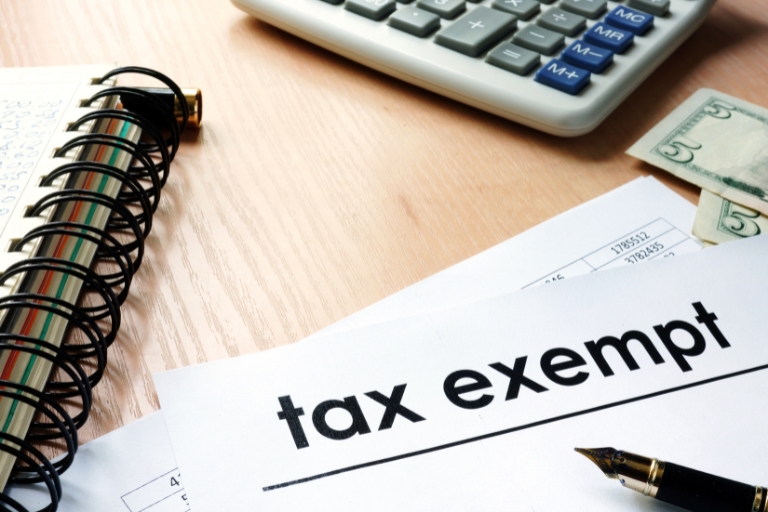Ah, taxes! The bane of our existence, the thorn in our side, the… well, you get the picture. But fear not, dear reader, for we are about to embark on a journey into the wild and wacky world of tax exemptions. So grab your calculator, your favorite pen, and a large cup of coffee (you’re going to need it), and let’s dive in.
Before we begin, let’s get one thing straight: taxes are no laughing matter. Well, unless you’re a tax accountant with a strange sense of humor, in which case, carry on. But for the rest of us, taxes can be a source of confusion, frustration, and the occasional bout of uncontrollable sobbing. But with a little knowledge and a lot of patience, we can navigate the tax seas like a pro. So let’s set sail!
What is a Tax Exemption?
What’s that? You thought a tax exemption was a mythical creature, like a unicorn or a competent politician? Well, you’re in for a surprise. A tax exemption is a portion of your income that you don’t have to pay taxes on. It’s like a get-out-of-jail-free card, but for your wallet. And unlike unicorns, tax exemptions are very real and very useful.
Now, before you start planning your next vacation with all the money you’re going to save, let’s get one thing straight: tax exemptions aren’t a free-for-all. There are rules and regulations, and the tax man is always watching. So let’s take a closer look at what tax exemptions are, and how they work.
Types of Tax Exemptions
Like snowflakes, no two tax exemptions are alike. There are personal exemptions, dependency exemptions, and even exemptions for the blind and elderly. It’s like a buffet of tax breaks, and everyone’s invited.
Personal exemptions are for you, the taxpayer. Dependency exemptions are for those lovable leeches we call dependents (kids, we’re looking at you). And exemptions for the blind and elderly are, well, for the blind and elderly. Each of these exemptions has its own rules and regulations, so let’s break them down one by one.
Personal Exemptions
Personal exemptions are like a gift from the tax gods. They allow you to reduce your taxable income, which means you pay less in taxes. It’s like a discount on your tax bill, and who doesn’t love a good discount?
Now, before you start doing a happy dance, let’s get one thing straight: not everyone qualifies for a personal exemption. There are income limits and filing status requirements, and the tax man is always watching. So make sure you read the fine print before you start counting your tax savings.
Dependency Exemptions
Dependency exemptions are for those little (or not so little) people who depend on you for their livelihood. You know, kids, elderly parents, that freeloading cousin who’s always crashing on your couch. If you’re supporting them, you might be able to claim a dependency exemption.

Now, before you start rounding up every dependent in a five-mile radius, let’s get one thing straight: not all dependents qualify for a dependency exemption. There are rules and regulations, and the tax man is always watching. So make sure you read the fine print before you start claiming every Tom, Dick, and Harry as a dependent.
Qualifying Child
A qualifying child is a dependent who is either under the age of 19 or a full-time student under the age of 24. They must live with you for more than half the year and not provide more than half of their own support. So if your kid is a self-made millionaire, you’re out of luck.
Now, before you start disowning your successful offspring, let’s get one thing straight: there are exceptions to these rules. For example, if your child is permanently and totally disabled, they can be any age and still qualify as a dependent. So don’t give up hope just yet.
Qualifying Relative
A qualifying relative is a dependent who isn’t a qualifying child. They can be any age, but they must live with you all year and their gross income must be less than the exemption amount. They also can’t be claimed as a dependent by anyone else. So if your freeloading cousin is also mooching off your sister, you’re out of luck.
Now, before you start evicting your relatives, let’s get one thing straight: there are exceptions to these rules. For example, certain relatives (like your parents) don’t have to live with you to qualify as dependents. So don’t start packing their bags just yet.
Exemptions for the Blind and Elderly
Exemptions for the blind and elderly are exactly what they sound like: tax breaks for people who are blind or elderly. If you’re over the age of 65 or legally blind, you might qualify for an additional exemption.
Now, before you start celebrating your golden years or your lack of sight, let’s get one thing straight: not everyone qualifies for these exemptions. There are income limits and filing status requirements, and the tax man is always watching. So make sure you read the fine print before you start counting your tax savings.
Qualifying for the Blind Exemption
To qualify for the blind exemption, you must be legally blind. This means that your vision can’t be corrected to better than 20/200 in your better eye, or your field of vision must be 20 degrees or less. If you’re not sure whether you qualify, check with your eye doctor. They’re the experts, after all.
Now, before you start faking blindness to save on taxes, let’s get one thing straight: the tax man is always watching. And pretending to be blind when you’re not is not only illegal, it’s also pretty darn unethical. So keep your eyes open and play by the rules.
Qualifying for the Elderly Exemption
To qualify for the elderly exemption, you must be 65 or older by the end of the tax year. This means that if your 65th birthday is on December 31, you qualify. Happy birthday and happy tax savings!
Now, before you start faking your age to save on taxes, let’s get one thing straight: the tax man is always watching. And pretending to be older than you are is not only illegal, it’s also pretty darn unethical. So keep your birth certificate handy and play by the rules.
How to Claim Exemptions
Claiming exemptions is like playing a game of tax bingo. You fill out your tax form, check off the exemptions you qualify for, and hope for the best. But like any game, there are rules and regulations, and the tax man is always watching.
Now, before you start marking off exemptions willy-nilly, let’s get one thing straight: not all exemptions are created equal. Some are worth more than others, and some are harder to qualify for. So make sure you read the fine print before you start playing tax bingo.
Filling Out Your Tax Form
Filling out your tax form is like taking a test. You read the questions, fill in the answers, and hope you don’t make any mistakes. But unlike a test, there’s no grade at the end. Instead, you get a tax bill (or a refund, if you’re lucky).
Now, before you start panicking about your math skills, let’s get one thing straight: you don’t have to be a math whiz to fill out your tax form. There are instructions and tax tables to help you along the way. And if all else fails, you can always hire a tax professional to do the hard work for you.
Claiming Your Exemptions
Claiming your exemptions is like cashing in your tax coupons. You list them on your tax form, subtract them from your income, and voila! You’ve reduced your taxable income and saved on taxes.
Now, before you start celebrating your tax savings, let’s get one thing straight: claiming exemptions isn’t a guarantee of tax savings. There are income limits and phase-out rules, and the tax man is always watching. So make sure you read the fine print before you start cashing in your tax coupons.
Conclusion
And there you have it, folks! A comprehensive guide to tax exemptions, served up with a side of humor. We’ve covered what tax exemptions are, how they work, and how to claim them. We’ve even thrown in some jokes for good measure. Because let’s face it, taxes are no laughing matter. But with a little knowledge and a lot of patience, they don’t have to be a source of stress.
So the next time you’re faced with a tax form, don’t panic. Just remember what you’ve learned here today, grab your calculator and your favorite pen, and tackle that tax form with confidence. And remember, the tax man may be watching, but you’ve got this. Happy tax season!


